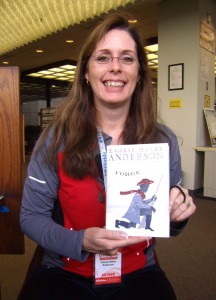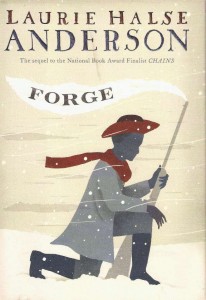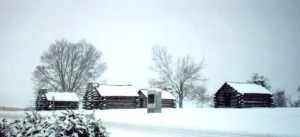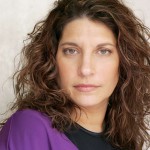Cultural Corner
Author Laurie Halse Anderson
By Marla E. Schwartz
The waltz is a dance described as smooth, graceful and vital in performance. The same can be said about author Laurie Halse Anderson, whose name Halse is pronounced like the word “waltz.” This

Laurie, who appeared last year at Miami Book Fair International 2010, spoke to audiences about her book FORGE (Simon & Schuster Children’s). She’s one of those rare writers who emerge once-in-a-lifetime as this New York Times-bestselling author writes specifically for kids, tweens and teens. One of her specialties is writing historical thrillers and FORGE, which falls into this category, is the second out of her Chains Series, which began when her novel CHAINS was published in 2008. FORGE was published in 2010 and the final book in the trilogy tentatively titled ASHES is still to come. The admiration I have for Laurie is layered, but the research she conducted in order to write FORGE is something I’ll always respect; particularly since it takes place in Valley Forge, PA – specifically in Valley Forge National Historic

Park, which is one of the most important places in this country’s history. Without what it represents, none of us would enjoy the freedom we now have today. Additionally, Laurie is a descendant of numerous individuals who were involved in combat during the American Revolution so she’s personally invested in telling this story. Therefore, the preparation she conducted before writing this book was actually more of a calling for Laurie. Her groundwork is comparative to homework. She carried out measures I’ve only dreamt of doing; walking barefoot in the snow, cooking over open fires, writing by candlelight and splitting wood all in an attempt to gain insight and appreciation for the sacrifices that were made not only by her ancestors but by everyone who fought in the American Revolutionary War.
CHAINS (a finalist for the National Book Award and winner of the Scott O’Dell Award for Historical Fiction), is told from the point of view of Isabel, a 13-year old slave owned by an affluent New York City family who backed-up the British point of view. FORGE is about Isabel’s friend, an enslaved fifteen-year-old named Curzon. They had run away together but due to conflicting ideas of what to do next they became separated. Curzon enlists as a soldier fighting for the American cause in the war and endures not only a great deal of disrespect from his fellow soldier’s because of the color of his skin but manages to survive through a very harsh winter. Eventually, many of his peers came to respect this combatant who displayed great acts of courage during a time when men survived for days on end without food while digging miles of trenches through snowdrifts and suffering from a myriad of diseases that caused so many to perish. And if you’ve been to Valley Forge National Historic Park you can see close-up a series of log cabins which are recreations of the 1777-1778 barracks that served as shelter for General George Washington’s Continental Army’s winter encampment. Both CHAINS and FORGE are novels that not only have a contemporary feel to them but also flawlessly capture the represented time period. This is the mark of a genius.
It was during her visit to MBFI 2010 that Laurie answered some questions to us an about her work.
AroundWellington: Thank you for coming to MBFI and letting me speak to you today.
Laurie Halse Anderson: Oh. Of course. And Mitchell Kaplan* is a God. {*For those of you who don’t know, Mitchell is one of the Co-Founders of MBFI and is the Founder, Owner and President of Books & Books.)
AW: I totally agree. He’s such a nice guy. Why did you create the character of Mrs. Cook in FORGE? I really like her interaction with Curzon.
LHA: Well, books have to have layers and this is a book that deals with a very serious subject. You’re talking about war, slavery and people abusing each other in the worst possible ways and I had to find some way to have moments of kindness, moments of humor and laughter. Having an elderly grandmotherly type woman who has been around a few times, she knows when she sees a boy in love and is a lovely counterpoint to some of the dark things in the book.
AW: I agree. I think that’s why I like her so much. Now this may sound like an odd question, but in the beginning, this word here ‘vexatious’ …
LHA: “Vexatious.”
AW: I love that word. I wrote something once with a word similar to it and was told that I couldn’t use it because nobody would know what it means. Does anybody say such a thing to you when writing your books, or this book in particular?
LHA: Well, we did at the end of FORGE, put a vocabulary list. One of the challenges of writing about the eighteenth century for readers today, well, there are several, but one is that the language has obviously changed. But we can’t make assumptions about how working people spoke. We only have evidence of educated people’s writings and we don’t even necessarily know if that’s how people spoke but that’s how they wrote. So I try to with the grammar and the conversational style though it’s probably not absolutely eighteenth century, to give kids a flavor of a different time period. By pulling out words that they can look up in the vocab or to figure out themselves allows them to go, ‘oh yay, a different world.’ Actually, my family loves me so much that they gave me the Oxford Unabridged English Dictionary. All twenty-seven volumes of it.
AW: Really? You’re so lucky!
LHA: I am! And on Christmas Day all I did was read the book. I was paging through it. But I had to, especially with these words; make sure they were actually in use during that time period.
AW: Yes. That’s hard do.
LHA: But not if you have the Oxford Unabridged English Dictionary! (She laughs.)
AW: Maybe I can come to your house and borrow it?
LHA: You should.
AW: I know that you’re a descendant of American Revolutionary War soldiers. What side of your family are they from, both sides?
LHA: Both sides. And some fought for the Patriots and some fought for the British.
AW: Really?
LHA: Yah, yah.
AW: How many generations does this go back?
LHA: It would’ve been four greats or five greats. And it’s not like it’s something that has been handed down in family lore at all. My mother had no clue but when I had children I started to do our family genealogy and started digging around and I kept on finding all these people.
AW: Was your mom excited to find out?
LHA: No, not really. My mother doesn’t care. (She laughs.)
AW: I actually lived in Philadelphia and went to Valley Forge National Historic Park and it has great running and biking trails. I know that you’re a runner, did you run when you were at the park?
LHA: No, but I walked there several times and as a matter of fact I’m going to Philly this afternoon to run in a race downtown tomorrow. But I was actually at Valley Forge on election day on this book tour and it was so cool because they had a couple of the rangers there dressed in appropriate garb, revolutionary war garb, so we led a group of home

schoolers and other kids to the reconstructed huts and talked about it on election day of all days and that was so awesome. And the more I learned, I went to a lot of primary sources and reading the letters that were written from camp and reading what was in the newspapers and just realizing that for these people there were no guarantees. From our perspective, looking back, it’s like a fete complete. But then they were over-throwing the government completely and starting from scratch and if it didn’t work out they would lose everything and we would have a slightly different accent.
AW: Tell me why, when you were growing up, did people have such a difficult time pronouncing your last name? Why didn’t they just ask you how to pronounce it?
LHA: (She laughs.) I wasn’t the best student in the world and I would occasionally be called down to the Principal’s office and I can remember being so frustrated because if you’re going to call me down to the office, at least respect the name. You know what happened for my last birthday, a couple of weeks ago?
AW: No. Tell me. And happy birthday.
LHA: Thanks. For the first time ever Garrison Keillor put me on and he pronounced my name right so I feel totally vindicated. I’m actually going to have my kids take that little clip and turn it into my ringtone.
AW: Great idea. Tell me about the cottage your husband built for you, so you have a private place to go and write. How long ago did he build it?
LHA: It was made in the spring/summer of 2009. There’s no Internet, no phone and I’ve been very strict with myself about keeping it sacred and I only do creative things out there; I don’t pay any bills, I don’t do email… I’m either reading, writing or drawing.
AW: I think it’s important to unplug so you can concentrate on your work. It’s hard. Many people say they want to be writers but they cannot unplug.
LHA: That’s because it’s not important enough to them yet. When it becomes important enough, they will unplug.
AW: When you were young when did you first become interested in being a writer?
LHA: I never thought that I’d be an author when I was a kid. It never occurred to me. But as a little kid I liked the Little House on the Prairie books and I was very interested in history. That was a class I did well in and when I got to middle school and high school all I was reading was fantasy and science fiction. I started writing when my children were small so I started out with picture books and as they got older and the books they were reading got older and the books that I was writing got older, too.
AW: So would you say it’s your children who inspired you to write?
LHA: I think so because I was the mom who went to the library all the time and brought home bags full of books. At the time I was working as a freelance journalist and I can remember seeing a book called either Princess Fergie or a book that Dolly Parton wrote and I remember thinking ‘you know, if they can do it, I wonder if I can do it too?’ That was my moment.
AW: How do you choose the titles for your books?
LHA: Since my first novel was called SPEAK and it did quite well, the publisher leaned on me a bit to stay with the one-word title because it’s a way for people to remember me. And it’s interesting because it’s become like my signature and it’s shorter than my name.
AW: And people can pronounce those short titles.
LHA: That’s right. Exactly. And sometimes it comes very quickly in the writing process and I’ll know exactly what the book is going to be called but other times it takes me awhile and that’s usually a sign that I’m still not clear about what the heart of the story is; when I figure out the heart of the story then I have the title. It’s a good measuring stick for me.
AW: What is the most popular question that young people ask you?
LHA: Kids always asked what inspired you. I think they’re smart and they’re looking to figure out what is this strange thing called a grown-up and how do some grown-ups turn out like this and others turn out like this and so they’re curious. I think they know a creative life is usually less secure than the traditional go to school, get a degree, get a job types of occupations so they want to understand that; and there’s a little of magic involved, I think and kids sense that and want to know more about it.
AW: Do your children read your books before they’re published?
LHA: Most of them do.
AW: Do they help you edit? Well, not literally edit like an editor, but do they make comments that are helpful to you? Do you think any of them will become writers?
LHA: It depends on the kid and it depends on who you’re talking about as I have four kids. They’re now 25, 24, 23 and 18 and they’re all grown up and very busy with busy lives. My oldest daughter lives in Brooklyn in an area called Greenpoint. Her name is Stephanie Anderson and she works at a great little independent bookstore called WORD and she’s a very, very good writer. But since she grew up with a writer, she understands the financial difficulties and securities one faces with this profession. I think she’ll keep her job and write on the side.
AW: Do you have any particular favorite character that you’ve created?
LHA: Hmmmm. You know, that’s like asking me which one of my kids do I like the best and it kind of depends on the day. (She laughs.) I love all of them and they’re so alive for me and I worry about them, what they’re doing now … you never call, you never write. They’re my babies.
AW: How did you feel after the Associate Professor of Management at Missouri State University, Wesley Scroggins, demanded that your book SPEAK be pulled from the shelves? When you first found out about that, where were you and what was your reaction? {The main character in this book is a young teen named Melinda who was so traumatized by being raped that she didn’t speak for nine months.}
LHA: It was a Sunday morning and I was at home checking my email and checking my twitter feed and somebody tweeted me a link to the editorial that he wrote in his local newspaper and when I read it – my first reaction was disbelief. ‘No, he didn’t say that, come on, seriously. Seriously?’ And then I got really angry because he was lying about my book and I was afraid that if his lies went unchallenged that the people in his community wouldn’t understand the full story. So the local paper {The Springfield News-Leader}was very kind and gave me an opportunity to write a rebuttal editorial and I blogged about it. And then it blew up on the Internet, it was in Entertainment Weekly and The Guardian Newspaper in England was covering it. What has happened is that there has been a real shift in education in the past fifteen years and there’s this new generation of English teachers who understand if the goal is to produce literate Americans, then handing most kids a canon of books that were written 150-years ago by rich white guys for other rich white guys they don’t necessarily connect with – doesn’t work. They’ve been really brilliant about finding literary contemporary texts that will serve that purpose and connect kids with reading and keeping them reading so they’ll be literate. And those English teachers when they found out what this guy was saying they just grabbed that bull by the horn and ran and started the Speak Loudly campaign. It actually turned out to be a great thing. I owe that dude a thank you note because he started out in a really negative, destructive place and what has grown out of it is has been so amazing and beautiful and constructive. The Speak Loudly campaign isn’t just about my book but is about books for teens of all kinds, all different books, so I really do owe him a thank you note.
AW: I like the way you take the negative and turn it into a positive.
LHA: Absolutely.
AW: And didn’t Judy Blume send you a letter about it?
LHA: Judy Blume tweeted me. I met her once at a conference, she wouldn’t remember this, but I was struck dumb. She shook my hand and I was like foaming at the mouth.
AW: Well, you should foam at the mouth. She’s great.
LHA: Oh yah. I think she has a place in Key West. She’s filming a movie now in New Mexico. She’s an extraordinary woman and has been a loud and consistent voice against censorship. If you’re going to be in America, I’m sorry, go to another country where they censor books, but don’t do it here. Not on our soil.
AW: Did you ever live in Philadelphia?
LHA: I did.
AW: I knew you worked for The Philadelphia Inquirer, but I wasn’t sure if you lived in Philly. How did you get this job?
LHA: I got real lucky. I needed a job when my kids were young and it had to be a job where I could work at night because we couldn’t afford a babysitter. I started being a stringer for a local newspaper in a suburb north of Philly in Montgomery County and worked there long enough and The Inquirer had a position for a stringer open. Basically I snowed my way in and worked with wonderful editors. I think that had a lot to do with my writing because the editors were very generous with their time and helping me learn how to write well.
AW: Do you remember the most encouraging as well as the most discouraging rejection letters you received when you first started to write?
LHA: I think the most discouraging rejection letters were the form rejections and I got a lot of ‘em because I didn’t understand the revision process when I started writing. So I thought if I was good enough to be a writer that my first drafts would be brilliant. I got a lot of form rejections and they’re so heartless. You can read between the lines and I thought in my head how they were laughing as they put it in the envelope and I made myself miserable. And there were a couple of encouraging rejections and actually one of them came from an editor I wound up working with who said ‘you know you have a great gift of language and I don’t want you to stop writing but you’re not quite there yet, but don’t quit.’
AW: That’s wonderful because it’s hard to keep on going when you get so many rejections letters.
LHA: Sure, you think, ‘why am I doing this?’ I was blessed. I want to thank that editor.
AW: As do I. Thank you!
For a complete list of Laurie’s books and information on awards and nominations she has received, you can visit her website: www.madwomanintheforest.com. You can also communicate with her via twitter: http://twitter.com/halseanderson or through email: laurie@madwomanintheforest.com. And make sure you mark down the date of MBFI 2011, November 13 – 20th and for more information on this extraordinary book fair please go to: www.miamibookfair.com.
***

A Toledo, OH native, a graduate of Kent State, Marla E. Schwartz is a Senior Writer for Miami Living Magazine, a freelance writer for Lighthouse Point Magazine and the a cultural arts columnist for AroundWellington.com Her photographs have appeared in these publications, in many Ohio periodicals, as well as in The Miami Herald, The Ft. Lauderdale Sun-Sentinel and The Palm Beach Post. She has had numerous plays published and produced around the country. Her short play, America’s Working? was produced in Los Angeles at both the First Stage and the Lone Star Ensemble theater companies, in Florida at Lynn University and at an Off-Broadway playhouse in NYC. Her piece, The Lunch Time Café, was a finalist for the Heideman Award, Actors Theatre of Louisville. Please check out the re-prints of her interviews with authors Dave Barry & Ridley Pearson and Dexter novelist Jeff Lindsay in the October 2010 issue #2 and Chris Bohjalian in the April 2011 issue #3 of Duff Brenna’s ServingHouse: A Journal of Literary Arts at www.servinghousejournal.com. You can contact her at marlaschwartz@att.net.

